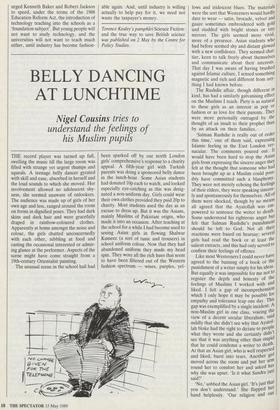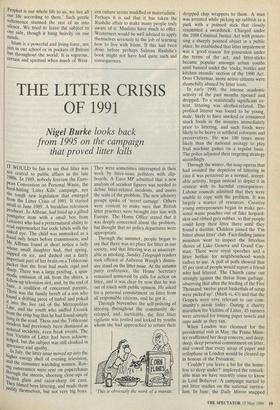BELLY DANCING AT LUNCHTIME
Nigel Cousins tries to
understand the feelings of his Muslim pupils
THE record player was turned up full, swelling the music till the large room was filled with strange yet urgent thumps and squeals. A teenage belly dancer gyrated with skill and ease, absorbed in herself and the loud sounds to which she moved. Her involvement allowed no adolescent shy- ness, she seemed unaware of onlookers. The audience was made up of girls of her own age and less, ranged around the room on forms in dignified poses. They had dark skins and dark hair and were gracefully draped in rainbow-coloured clothes. Apparently at home amongst the noise and colour, the girls chatted unconcernedly with each other, nibbling at food and casting the occasional interested or admir- ing glance at the performer. Aspects of the scene might have come straight from a 19th-century Orientalist painting.
The unusual scene in the school hall had been sparked off by our north London girls' comprehensive's response to a charity appeal. A fifth-year girl with Turkish parents was doing a sponsored belly dance in the lunch-hour. Some Asian students had donated 10p each to watch, and looked especially eye-catching as this was desig- nated a non-uniform day. Girls could wear their own clothes provided they paid 20p to charity. Most students used the day as an excuse to dress up. But it was the Asians, mainly Muslims of Pakistani origin, who made it into an occasion. After teaching at the school for a while I had become used to seeing Asian girls in flowing Shalwar Kameez (a sort of tunic and trousers) in school uniform colour. Now that they had abandoned uniform they made my head spin. They wore all the rich hues that seem to have been filtered out of the Western fashion spectrum — wines, purples, yel- lows and iridescent blues. The materials were the sort that Westerners would hardly dare to wear — satin, brocade, velvet and gauze sometimes embroidered with gold and studded with bright stones or tiny mirrors. The girls seemed more vivid, more of a presence. Asian students who had before seemed shy and distant glowed with a new confidence. They seemed chat- tier, keen to talk freely about themselves and communicate about their interests. That day I was aware of having brushed against Islamic culture, I sensed something magnetic and rich and different from any- thing I had known before. The Rushdie affair, though different in kind, has had a similarly galvanising effect on the Muslims I teach. Piety is as natural to these girls as an interest in pop or fashion or as love for their parents. They were more personally outraged by the thought of an insult to their prophet than by an attack on their families.
`Salman Rushdie is really out of order this time,' one of them said, expressing Islamic feeling in the East London ver- nacular. The comments poured out. It would have been hard to stop the Asian girls from expressing the sincere anger they felt at the thought that someone who had been brought up as a Muslim could poss- ibly have committed such a blasphemy. They were not merely echoing the feelings of their elders, they were speaking sincere- ly and spontaneously for themselves. All of them were shocked, though by no means all agreed that the Ayatollah was em- powered to sentence the writer to death. Some understood his righteous anger but felt that Salman Rushdie's punishment should be left to God. Not all their reactions were based on hearsay; several girls had read the book or at least the salient extracts, and this had only served to confirm their feelings of offence. Like most Westerners I could never have agreed to the banning of a book or the punishment of a writer simply for his ideas. But equally it was impossible for me not to register the depth and honesty of the feelings of Muslims I worked with and liked. I felt a gap of incomprehension which I only hope it may be possible for empathy and tolerance leap one day. This gap was exemplified by a single incident. A non-Muslim girl in one class, voicing the view of a decent secular liberalism, said mildly that she didn't see why that Ayatol- lah bloke had the right to dictate to peopl what they wrote and she certainly didn t see that it was anything other than stupid that he could condemn a writer to death. At that an Asian girl, who is well respected and liked, burst into tears. Another girl moved across the room and put her arm round her to comfort her and asked her why she was upset. 'Is it what Sandra just said?' 'No,' sobbed the Asian girl. 'It's just that you don't understand.' She flapped her hand helplessly. 'Our religion and our Prophet is our whole life to us, we live all our life according to them.' Such gentle vehemence stunned the rest of us into silence. We tried to leave the subject to one side, though it hung heavily on our minds.
Islam is a powerful and living force, not just in our school or in pockets Of Britain but throughout the world. It is vigorous, certain and spiritual when much of West- ern culture seems muddled or materialistic. Perhaps it is sad that it has taken the Rushdie affair to make many people truly aware of it. Muslims have much to offer. Westerners would be well advised to apply themselves seriously to the job of learning how to live with Islam. If this had been done before perhaps Salman Rushdie's book might not have had quite such sad consequences.



























































 Previous page
Previous page